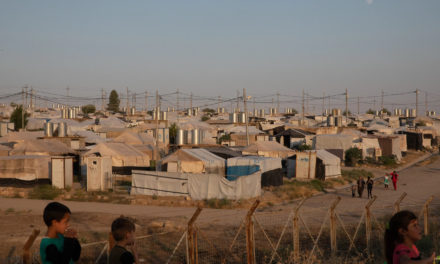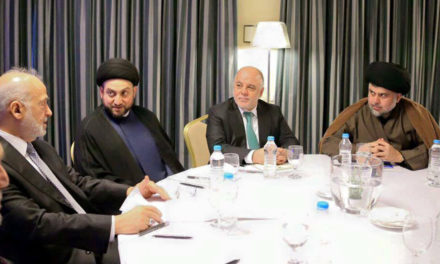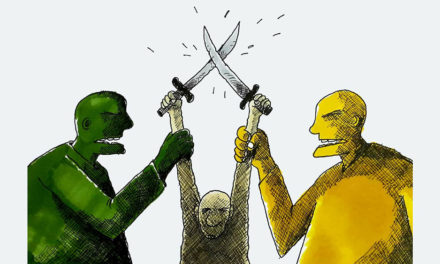Ever since ISIS stormed Mosul in the summer 2014 and swept across swathes of Iraqi towns and villages, Western and Arab pundits have insisted that only local Sunni forces would be capable of defeating the transnational terror group. Last week, Iraq’s military leadership announced that ISIS now controls less than 7% of Iraqi territory, and yet with the exception of a handful of prominent Sunni tribes including the Jughayfa of Haditha and the Shammar of Ninewa, local Sunni armed groups have played a minimal role in defeating the ISIS occupation. The vast majority of these battles have been led by Shia-majority special operations forces, Iraqi Security Forces, PMFs and Kurdish Peshmerga.
The assertion that ISIS can only be defeated in Iraq if the United States empowers the Sunni tribes has been peddled by Western commentators since Fallujah fell to ISIS in January 2014. Among its most notable advocates is the Washington Post columnist David Ignatius. To make his case, Ignatius often cites one of his favorite go-to Iraqi Sunni tribal sheikhs in Amman, Zaydan al-Jabari from the Tribal Revolutionaries movement. “We want to create a strategic relationship with the Americans,” declared Jabari in a 2015 interview.
But Jabari and the Tribal Revolutionaries have a deeply menacing past. He openly admitted to colluding with the Sunni insurgency that killed thousands of Iraqis and Americans after 2003, and only three days after ISIS took Mosul, he described the fall of the city as a “blessed revolution” and told Sky News, “If the West let us down this time, if they let our revolution down, we will be forced to cooperate with ISIS, and the world will be responsible for what the ISIS gangsters do to Iraq’s children.” Even a year after the fall of Mosul, Jabari publicly insisted that ISIS had not persecuted Christians or Yezidis in the city.
So why is Ignatius open to a strategic relationship with these unsavory characters? No one can dispute the imperative role of Sunni tribes in securing and defending liberated towns from ISIS. But why engage with exiled Sunni sheikhs that have done nothing to liberate their own towns from ISIS?
Like many journalists who were deeply invested in the Iraq War, Ignatius is not driven by a singular desire to defeat ISIS. The war created a multitude of interwoven traumas that have shaped his current outlook.
“I owe readers an apology for being wrong on the overriding question of whether the war made sense,” he lamented on the tenth anniversary of the Iraq War. “Invading Iraq to topple Saddam Hussein a decade ago was one of the biggest strategic errors in modern American history.”
Ignatius goes on to explain how the U.S. created a power vacuum in Baghdad that caused the chaos and violence that ensued. Described deridingly as the spokesperson for the CIA, Ignatius offers insights that often reflect what the intelligence community is thinking. In their view, the toppling of Saddam and the failings of the United States thereafter resulted in two catastrophic strategic errors – it handed over Iraq to the Iranians on a silver platter and it created deep enmity towards the U.S. among its traditional Arab allies.
Thus, his reflections on a post-occupation Iraq carry a subtle redemptive tone. “When we disbanded the nonsectarian army and most of the secular government, Iraqis had nowhere to turn but their most basic ethnic and tribal identities as Sunnis or Shiites, Kurds or Arabs,” writes Ignatius. But the notion that sectarianism in Iraq began in 2003 is historically erroneous. Shias and Kurds were systematically marginalized and excluded from the higher echelons of the Baath regime’s security and military apparatus, and even a brief excursion to southern Iraq would reveal how Saddam used identity politics to suppress dissent among Iraq’s Shia Arabs.
Ignatius would do well to read the recently declassified CIA report on how Saddam was able to maintain his grip on power by appointing relatives from Tikrit to senior security, military and party posts across the country. Nonetheless, historical facts seem to be of little concern to Ignatius, who is convinced that U.S. interests would be well served by shifting the balance of power back in the direction of the Baathist old guard.
So when Ignatius advocates for a strategic alliance with sectarian Sunni militants in Iraq, it is fundamentally about how the United States can reassert its influence in Iraq, win back its Arab allies and create a bulwark against Iranian dominance in the country.
For any Western commentator looking to garner support for this cause, a tried and tested recipe typically includes these key ingredients:
1) Find an aggrieved Sunni tribal sheikh with a Baathist past who is not directly affiliated with ISIS but was involved in armed insurrection against Baghdad; 2) extract a quote expressing feelings of abandonment by the United States in the face of Iranian-backed sectarian repression; 3) sprinkle some historical context about how the alliance between U.S. forces and the Sunni Awakening successfully decimated the insurgency; 4) top up with an ominous warning from the tribal sheikh about the consequences of U.S. inaction.
“We are three kilometers from Baghdad airport! We are 20 kilometers from the Green Zone!” al-Jabari tells Ignatius in April 2014. His group of ex-Baathist militants had promised to take back the capital from the so-called Safavid Shias with the infamous slogan “Qadimun Ya Baghdad” (We are coming, Baghdad).
The first step to legitimizing non-state armed actors is to question the very semblance of the state. “Iraq is not now a state. It is led by gangs,” declares Jabari. Once that premise is established, it becomes far easier to justify militant violence.
After these tribal sheikhs helped engineer the fall of Mosul in June 2014, they conditioned their willingness to fight ISIS on an American commitment to help them reclaim their rights. In their view, Sunnis had been forced into siding with ISIS because the alternative was far worse: “The Sunni community has two options,” insisted Jabari in late 2014. “Fight against ISIS and allow Iran and its militias to rule us, or do the opposite. We chose ISIS for only one reason. ISIS only kills you. The Iraqi government kills you and rapes your women.”
Then comes the ominous warning in the event that the U.S. fails to act: “Until Sunni rights are respected, [w]e will not allow the world to sleep.”
Notwithstanding the absurdity of comparing Iraqi forces to ISIS, the events that have unfolded over the past three years have shown how catastrophic the decision to ally with ISIS has been for Iraq’s Sunni communities.
“This Sunni opportunism can be reversed,” claims Ignatius. “The tribal leaders told me they want U.S. help, and they should get it.” But what rights do Jabari and his ilk want reinstated? As American Enterprise Institute scholar Michael Rubin puts it, “I have never met a Sunni politician who, after a couple hours of discussion and maybe a couple whiskeys, didn’t acknowledge that they sought to restore Sunni control over the Shi’ite population.” For people who are used to a life of privilege, equality feels like a step down.
There is no doubt that through his lengthy conversations with Sunni leaders in Amman, Ignatius is fully aware of this ambition. In one of his columns last year, he quotes Maj. Gen. Ali Shukri, an advisor on Iraqi tribes to King Abdullah of Jordan who notes that “many Sunni tribal leaders have never given up the atavistic dream that one expressed to him in 2005, after the United States had toppled Sunni dictator Saddam Hussein and transferred power to a Shiite-led government: ‘Iraq has always been ruled by Sunnis, and it will be again.’”
Many things changed after June 2014. Iraq’s Shias learned the bloody consequences of endemic corruption and internal bickering, and ordinary Sunnis realized that their leaders had led them down a path that ultimately led to their own destruction. The mass slaughter of Sunnis at the hands of ISIS illustrated the insanity of using terrorism as a bargaining chip to extract political concessions. And the United States should know that rewarding bad behavior only fuels the cycle of violence. Ultimately, it is up to Iraqis to define the parameters of reconciliation. But as the military campaign to extricate ISIS from Ninewa draws to a conclusion, one thing is clear: the countless Iraqi mothers from Mosul to Basra who lost and sacrificed their sons to defeat ISIS have no interest in what Zaydan al-Jabari and his band of revolutionaries have to say about the future of Iraq.

Ali Hadi Al-Musawi
Ali Hadi Al-Musawi is an Iraqi analyst and contributing writer at 1001 Iraqi Thoughts.










